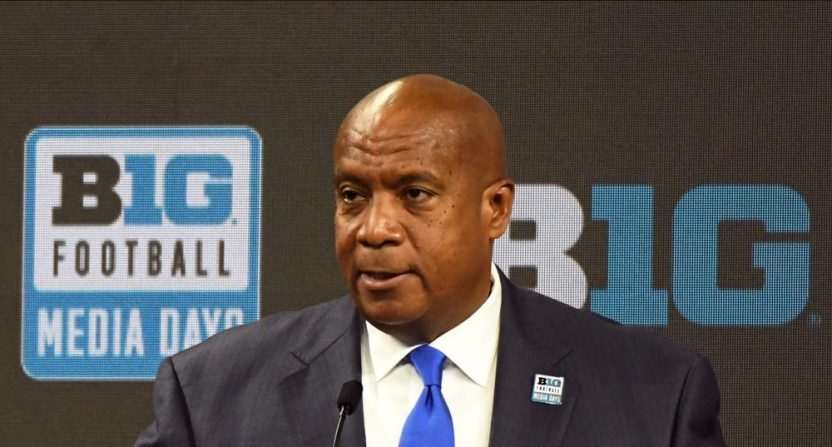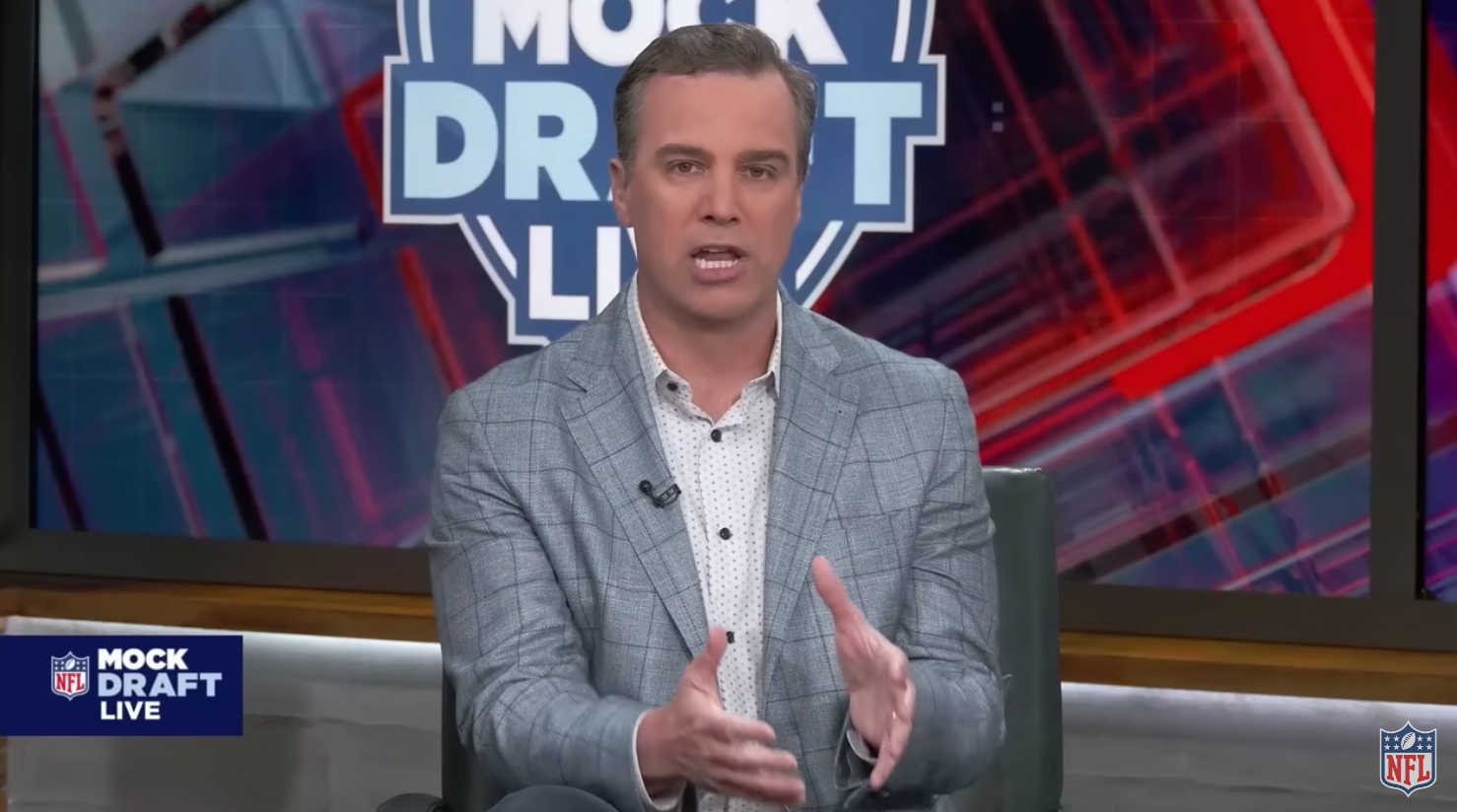It turns out the Big Ten’s next TV contracts (which begin this fall and run through 2029-30) may wind up being less lucrative than initially reported. When those deals were officially announced last August (following a lot of reporting on what was likely to be in them), Michael Smith of Sports Business Journal estimated them as being worth an average of $1.1 billion per year. But some of that money may soon disappear, with Pete Thamel of ESPN reporting this weekend that current commissioner Tony Pettiti is having issues finalizing the TV contract agreed to by predecessor Kevin Warren:
NEW: A look inside the issues new Big Ten Commissioner Tony Petitti is facing – “horse trading” to complete NBC TV deal, schools irked at tens of millions in overall lost revenue and coaches unhappy about transparency from the TV contract. https://t.co/3WTOBDBLC8
— Pete Thamel (@PeteThamel) May 21, 2023
All in all, the sums in this piece aren’t huge, and they don’t seem likely to derail this contract. (More on that later.) But this is quite a notable piece for its illustration of some of the divides here. And it features school ADs and coaches lobbing some notable criticisms at Warren over these TV deals.
The most interesting part of that piece is about how the Big Ten may receive less money than expected from Fox and NBC thanks to issues with those contracts. In particular with Fox, Thamel says the conference is going to have to “pay back” the network around $65 million in total, including “nearly 40 million” for the 2026 title game because “according to sources, Warren (seen above during the conference’s football media days last summer) delivered NBC the Big Ten football title game in 2026 without the full authority to do so.” The other part of that is “$25 million total for a deal to pay Fox back for lost 2020 football game inventory” over the pandemic.
(Brief side note: the “pay back” description Thamel uses here is interesting, as unlike with the Pac-12 and Comcast, the $40 million appears to be a future promise of revenue rather than an actual overpayment at this point. It’s possible there’s something where Fox already delivered a payment for the 2026 title game despite a still-not-finalized contract, but that seems unlikely. The $25 million is a more reasonable use of “pay back,” but it’s also not an issue with this current contract, it’s a correction for 2020. And while Warren took criticism there for the Big Ten’s slow return to play relative to many other conferences, that’s a separate issue from these new TV deals. And it’s one that can’t really be modified much at this point, unlike these future not-finalized deals.)
How could Warren (who left the Big Ten to take over as president of the Chicago Bears in January) “deliver” NBC a title game “without the full authority to do so”? Well, as Thamel notes, the conference’s TV rights are actually held by the Big Ten Network through at least the 2029-2030 season, thanks to a 2016 deal. The games not on BTN are then sublicensed to other broadcast partners. And BTN is partly owned by the conference, but majority-owned by Fox: Fox had a 49 percent stake to the Big Ten’s 51 percent when the network launched in 2007, but that flipped percentages at some point by 2011, and Fox increased its stake to 61 percent (for an estimated $100 million) in 2021.
This was why Fox was established as the Big Ten’s primary media partner for 2023-2030 before other broadcast partners were confirmed. It’s also why Fox Sports executives Mark Silverman (president and COO) and Larry Jones (executive vice president, business) sat in on the Big Ten’s meetings with other potential broadcast partners. But it’s unclear why, with those Fox executives sitting in on those meetings, Warren still wound up giving NBC a title game “without the full authority to do so.” It’s also unclear why, if that was such a big problem, it hasn’t been reported as an issue before now, as the NBC title game in 2026 (plus CBS ones in 2024 and 2028, which are not currently being cited as an issue) was included in last August’s official announcements. (However, it’s possible that this was flagged as an issue internally even before then, and just never made it to the media and the public until now.)
With that said, $40 million for one Big Ten conference championship game sounds about right. The Big 12 was looking for $20 million per game for three conference championship games under its old deal (and only got close to that thanks to an extra ESPN+ package), but the Big Ten game tends to draw higher ratings, and this current round of deals is all higher. So that seems like a reasonable dollar amount, and it makes sense that Fox’s payments to the Big Ten would drop if they believed their package included that game, but it didn’t actually.
Another notable issue is the one with NBC. That debate is about November night games in NBC’s primetime package, which Thamel says has “tens of millions of dollars in flux.” He writes that schools say they weren’t informed there would be late-November night games. The conference had historically included “tolerances” to allow schools to not play night games after the first weekend of November for reasons including health, recovery and campus logistics, which had usually led to the Big Ten’s biggest brands (including Ohio State, Michigan, and Penn State) not playing night games after that weekend. Those tolerances are supposedly not in the deal Warren struck, and school executives and coaches told Thamel they were surprised and disappointed by that, while network executives told him they’re surprised the schools weren’t aware of this.
Athletic departments and coaches around the Big Ten say they were surprised November night games would be part of the deal. They weren’t asked for permission to play them prior to the deal or informed of the change ahead of the deal, according to sources. At the same time, NBC wasn’t aware until well after the initial contract was signed this summer that these big-brand schools had historic tolerances that were part of the prior television arrangements and would resist being available.
“NBC was surprised, and I was surprised,” said Michigan athletic director Warde Manuel. “We had not discussed, and I had not discussed with anyone in the league to change the tolerances we had agreed upon years ago.”
Within the industry, though, there was an expectation that, considering the scope of the deal, all schools would play in prime time.
“The fault here is with the administrators on campus,” said another industry source. “How did the presidents, chancellors and athletic directors not know this? The universities all signed off on the deal.”
That is, indeed, an excellent question. It is of course possible that Warren poorly communicated with the schools on just what would be asked of them in this new contract. And this would be far from the first time that there was a divide between Warren and the Big Ten’s athletic directors, as they reportedly mocked him for his response to the COVID-19 pandemic (which included initially cancelling the 2020 football season before a later backtrack), and even contemplated a vote of no confidence. There were also some odd reports around his exit for the Bears, including a strange statement from the conference when it was initially reported he was interviewing claiming he “remains focused” on the Big Ten. And his actual exit led to many more shots from those in the college sports world, including one from SEC commissioner Greg Sankey.
However, there are a lot of questions here for the schools as well. As that industry source cites, it’s surprising that the school presidents, chancellors, and athletic directors wouldn’t have seen the night game issue before these deals were officially announced. That could be poor communication on Warren’s part with not checking in with the schools on doing away with those historic “tolerances,” but the schools probably should have had some communication on that front as well.
That’s especially true considering that the Big Ten had a new commissioner who came in from decades of work with NFL teams, but was negotiating his first national TV deal. If there were hard nos from specific schools on specific game windows, which would likely reduce the revenue potential for packages in that window, that should have been communicated to the commissioner. Outside of those specifically-defined parameters, his job was to maximize revenue, and it by and large looks like he did that.
The latest
Unlike with the Fox discussion (which is over past COVID cancellations and over a conference championship game seemingly fully given elsewhere), there may still be ways to remedy the NBC-Big Ten divide here. Thamel does note that the big brands are making some concessions this year, though, Those include Penn State playing on the road on Black Friday on short rest and Ohio State playing their latest-ever night home game on Nov. 11. And those somewhat-compromises might help a bit in convincing NBC that having a late-November primetime package without those big brands could be okay.
This also looks likely to get at least a little easier following the additions of UCLA and USC ahead of the 2024-25 season; many NBC night games (including that Nov. 11 Michigan State-Ohio State one) are set for 7:30 p.m. Eastern kickoffs, which would be just 4:30 p.m. Pacific, so it’s possible at least some regular late-November primetime games from 2024 on could be USC-UCLA and then one or both of those schools hosting other schools (possibly including those big brands). And that gets easier still if expansion rumors about adding other West Coast schools like Washington and Oregon come to pass.
All in all, even the amounts of money here may not be enough to knock the Big Ten out of the lead in NCAA conference television revenue. The Fox debate is over one conference championship game and $40 million, which would be just $5.7 million a year if amortized over the life of the contract, and a one-time $25 million COVID correction, which would be $3.6 million per year. It’s unclear if the “tens of millions” Thamel refers to as in flux on the NBC deal are each year or in total, but his suggestion earlier in the piece that “More than $70 million in total is suddenly in flux—nearly $5 million per school” suggests it may be total (and even that math doesn’t really work: $65 million plus “tens of millions” would seem to suggest at least “more than $85 million,” not “more than $70 million.”)
But $70 million in total would be less than one percent (0.98 percent) of this total TV deal, while $85 million would be 1.2 percent. And even one of the worst-cases scenario possible under this reporting ($20 million a year to NBC, so $140 million total there, plus $65 million to Fox) would only be 2.9 percent of the total TV deal. On a yearly basis, that would be a total loss of $29.3 million per year, which would drop the Big Ten to just over $1.07 billion per year. That could put them close to the SEC (it’s unclear just how much that conference will get from ESPN after the additions of Texas and Oklahoma, but some calculations suggest around $1.07 billion annually is possible), but they’d still be well clear of the rest of the college football landscape. (Of course, these deals are backloaded, as is typical, and they also have a further increase after the additions of the USC Trojans and UCLA Bruins ahead of the 2024-25 season. So the $1.1 billion is not what the conference will make this coming season. But the average yearly figure is the most useful one to talk about.)
Thus, overall, the issues Petitti and the Big Ten are having finalizing these deals are certainly worth discussing. And some of the criticisms of Warren’s handling of those deals may be fair. But a lot of that depends on the schools’ own actions and communication, too. Beyond finding fault, there’s interesting material to watch here going forward, perhaps especially around how the November night game divide gets resolved.
But the financial numbers here don’t seem large enough to alter the college football landscape, or to prevent these deals from being finalized in some form. (Indeed, Thamel has a NBC spokesperson saying “We’re confident that any and all outstanding issues are well on their way to being resolved.” So this seems to come down to more “complaints about these deals, from both networks and schools.” And they’re certainly notable complaints, and worth analyzing, but they don’t seem significant enough to lead to the deals’ collapse.
[ESPN; photo from Robert Goddin/USA Today Sports]







